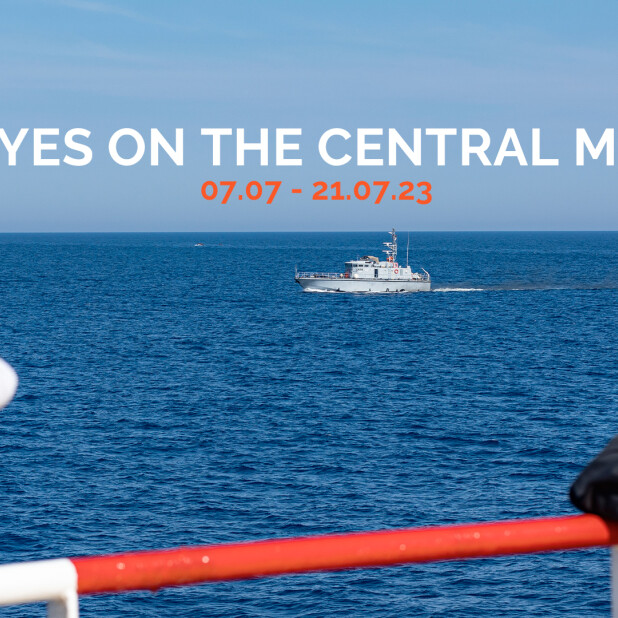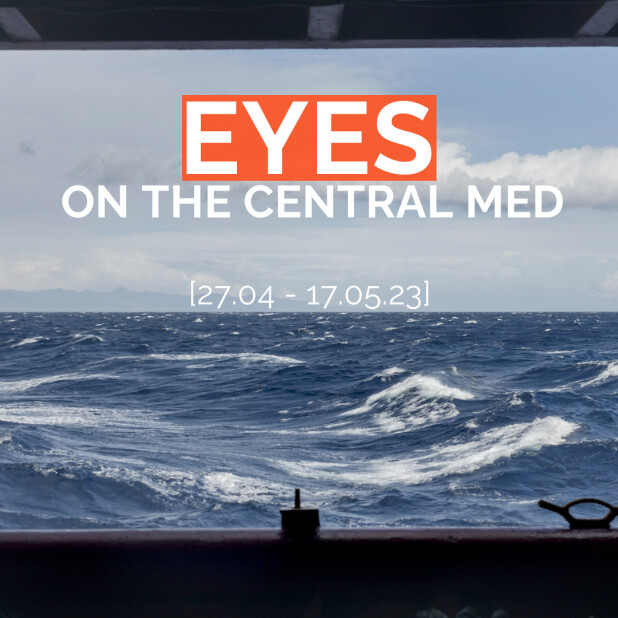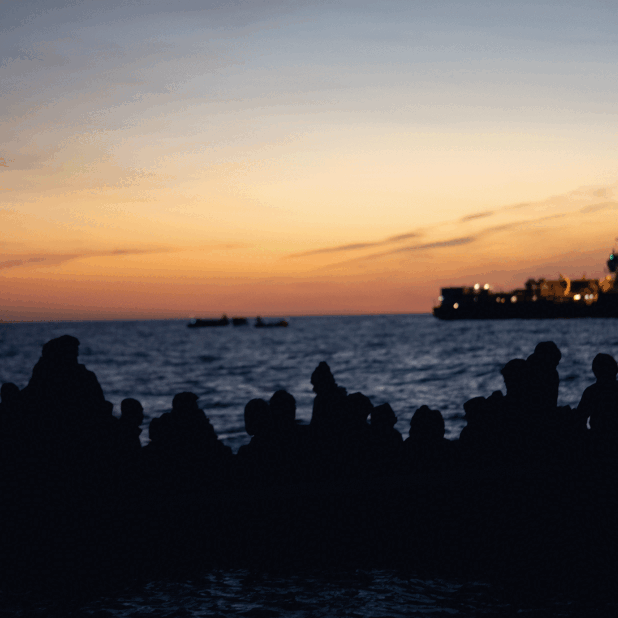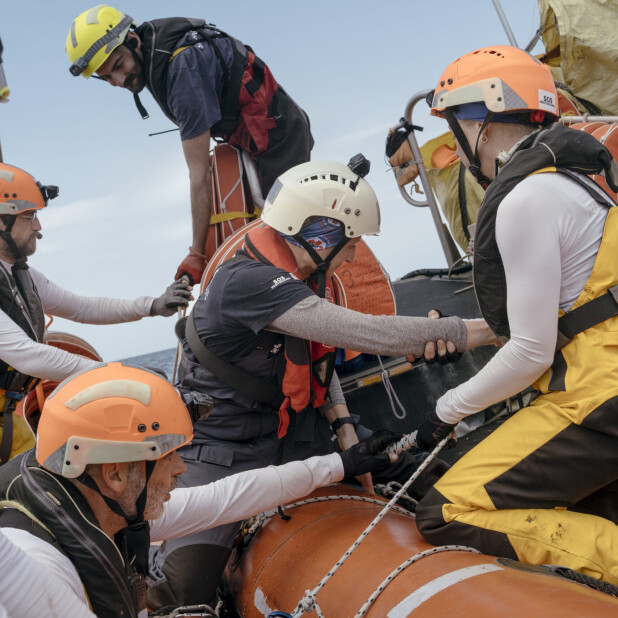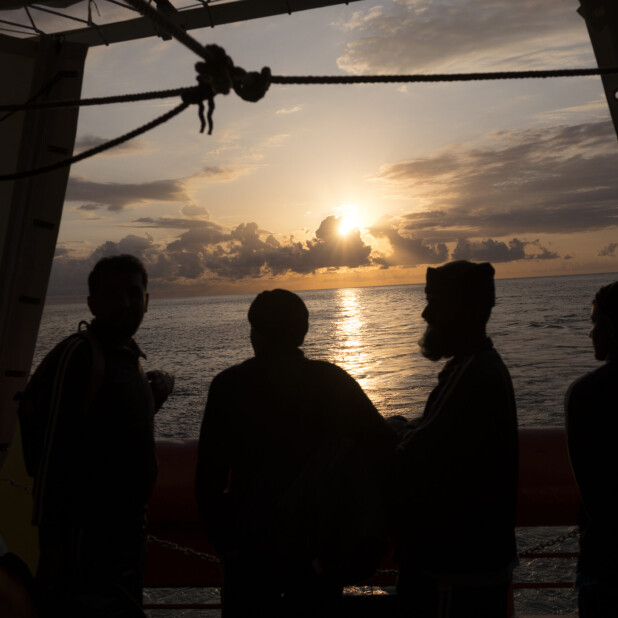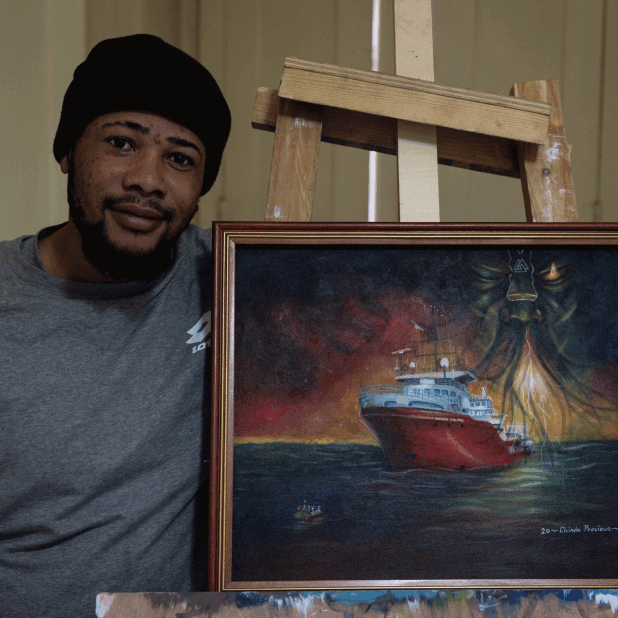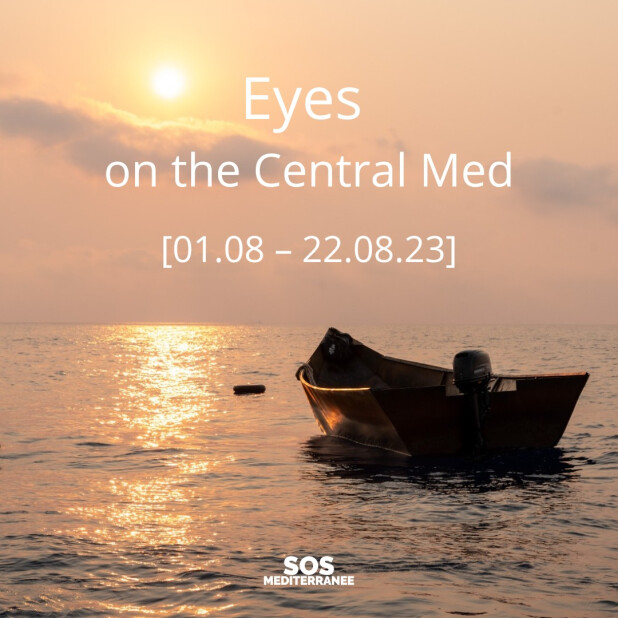
[09.06 – 21.06.23] The following publication by SOS MEDITERRANEE intends to shed light on events which unfolded in the central Mediterranean in the past weeks. It is not intended to be exhaustive, but rather to provide a general update on maritime search-and-rescue-related matters occurring in the area we have been operating in since 2016, based on public reports by different NGOs, international organisations and the international press.
Up to 600 people dead in a single shipwreck after Europe’s inaction, calls for independent investigation turned down by EU Commission
On June 14 early morning, the largest known tragedy since 2016 occurred in the Mediterranean. A large fishing vessel with approximately 750 children, women and men onboard capsized southwest of Pylos, off the Peloponnese coast in Greece. survivors said that over 100 children together with many women were in the bottom of the boat when she sank. The vessel reportedly left from Tobruk, in Libya on June 9. 104 people were rescued, 81 bodies were found, and about 568 people drowned, 47 Nautical Miles (87km) from European shores.
On June 13 morning, the civil hotline Alarm Phone was alerted to a large fishing vessel in distress. Shortly after, a Frontex surveillance aircraft detected the vessel and informed Greek and Italian authorities. According to the Greek authorities, the people onboard refused any assistance and were on a “steady Course and speed” before it sank. However, a BBC investigation tracking data of the boats around the vessel has revealed that she barely moved for seven hours before she capsized.
Alarm Phone received many calls from the people on the fishing vessel asking urgently for help and a multitude of experts in international and maritime law, UN agencies, maritime and humanitarian organisations denounced that any boat in distress should be rescued without delay. Judith Sunderland, Associate Director of the Europe and Central Asia Division at Human Rights Watch, stated that “the boat was in distress, it was unseaworthy, overcrowded and they had already launched distress calls to Alarm Phone. It is a paramount obligation of all vessels in the area, and certainly a coast guard, to provide immediate assistance”. Professor Erik Røsæg of the University of Oslo’s Institute of Private Law said that the Greek authorities “had a duty to start rescue procedures” given the condition of the vessel. As per maritime law, the boat was presenting several criteria of distress: the boat was overcrowded [in this case to an absolute extreme], no one had lifejackets, people on the boat in distress called a phone number (Alarm Phone) asking for rescue, there were women and children present onboard, the boat was unfit for navigation. Only one of these criteria suffice to declare a boat in distress. Here, all these elements are cumulated. The delay of intervention does not comply with obligations stated by maritime conventions.
Worse, many survivors accounts and the UNHCR Special Envoy for the Western and Central Mediterranean, Vincent Cochetel, suggested that there was a “maneuver by the coastguards to take the boat away from the Greek search and rescue area”. The UNHCR further called for an independent investigation to look into the responsibility of the Greek authorities in the shipwreck. However, on June 19, the European Commission refused to launch such an independent probe. According to the newspaper Politico, “the EU dispatched officials from the independent Agency for Fundamental Rights (FRA) and its border agency Frontex to Greece to gather evidence and cooperate with the local authorities. But they emphasized that these bodies have no investigative powers and that a probe won’t be launched.” The Greek Supreme Court did launch an investigation but mainly to locate the alleged traffickers which resulted in the arrest of nine survivors.
On June 11, nine bodies were also recovered after a shipwreck off Tunisia.
Illegal State’ instructions causing more disappearances while detentions of rescue ship and distant port policy continue
On June 10, a boat in distress taking water with 25 people onboard, was spotted by a Sea-Watch aircraft in the Maltese Search and Rescue Region. According to the NGO, the merchant ship MERV MARSEILLE was originally on her way to the boat but was ordered by Malta to move away and not assist the boat. Geo Barents of the NGO Médecins Sans Frontières searched for the boat in distress, in vain. The fate of the 25 people remains unknown.
On June 12, following an alert from Alarm Phone and with aerial support from Seabird, Geo Barents performed a rescue of 38 people in distress. The distant port of Ancona was designated by Italian authorities. The survivors could disembark three days after, on June 15.
On June 12 evening, the rescue ship Rise Above spotted 39 people in distress and stabilized the situation before the rescue ship Aurora completed the rescue. The Italian authorities instructed the ship to disembark the survivors in Trapani, 32 hours of navigation away. Due to bad weather conditions, Aurora disembarked the people in Lampedusa. On June 15, the Italian authorities detained the ship for 20 days.
On June 13, Open Arms performed the rescue of 106 people in distress in the central Mediterranean. The distant port of Livorno was consequently assigned. On her way to the port, the Open Arms crew spotted and assisted fourth overcrowded boats in distress before the arrival of the Italian coastguard.
On June 19, the Italian court of Lazio rejected the appeal of Geo Barents against the designation of the distant port policy.
Forced returns and thousands of people arbitrarily arrested while EU increases cooperation with Libya and proposes 1 billion of aid to Tunisia to curb departures despite human right violations
In the past days, Sea-Watch aircraft spotted several interceptions by the Libyan coastguard. According to the International Organisation for Migration (IOM), between June 4 and June 17, at least 793 people were forcibly returned to Libya.
In the meantime, on June 9, residents of the port of Zawiya witnessed Ministry of Defense’s drones bombing a fuel smuggling site in the city. According to the newspaper Libya Observer, the drones launched several raids on fuel and human smugglers sites in Al-Ajailat, Sabratha and Zuwara, in continuation of the second phase of the military operation launched by the Western Libyan government.
On June 12, the United Nations Support Mission in Libya stated its concerns over the mass arbitrary arrest of thousands of people across the country, notably in the East, in Tobruk and Musaid by Field Marshal Khalifa Haftar, commander in chief of the Libyan National Army (LNA). “Many of these migrants, including pregnant women and children, are being detained in overcrowded and unsanitary conditions. Thousands of others, including migrants who have entered Libya legally, have been collectively expelled without screening or due process.”
Despite these repeated human right violations, on June 13, the Minister of the Interior, Matteo Piantedosi stated in a press conference in Catania that Italy will ask Haftar “for a more fruitful collaboration in stopping departures”. The day before, a delegation from the Italian Ministry of Defence held a meeting in Tripoli with their Libyan counterparts to discuss joint military-technical cooperation notably to “tackle illegal migration”.
On the Tunisian side, similar dynamics of border deterrence can be observed. According to the Tunisian Forum for Economic and Social Rights, a total 23,093 people was returned to Tunisia by the Tunisian Coast Guard in 2023 only. In this effort to curb the continuous arrival from Tunisia, the European Union stated on June 11 that they were ready to support Tunisia with a total of more than €1 billion of aid in return for better border control and measures against human smuggling “as soon as the necessary agreement is found,” European Commission President Ursula von der Leyen said after meeting the Tunisian president who publicly incited racism and violence in Tunisian society in March this year. According to the NGO Sea-Watch, such a huge amount of funds could have been used to provide a civil, state-financed and coordinated European sea rescue operation to ensure compliance with maritime and human rights law across the Mediterranean.
New EU position ‘Pact on Migration and Asylum’ reducing protection standards with no solutions in alleviating people trapped in detention centres in Libya
On June 9, European Union Member States agreed a negotiating position on the ‘Pact on Migration and Asylum’ to reform EU asylum law. According to Amnesty International, the Pact will overall reduce standards of protection for people arriving at the European Union’s borders. EU Advocacy Director for Amnesty International, Eve Geddie, said ““This pact will do nothing to alleviate the suffering of thousands of people stuck in camps on the Greek islands, or in detention centres in Libya. Nor will it provide the needed support to countries where people seeking safety first arrive. While the commitment to monitor abuses at the borders is welcome, this does not make up for the fact that the pact makes detention the norm and relies on deterrence, containment in camps and cooperation with abusive governments.”

